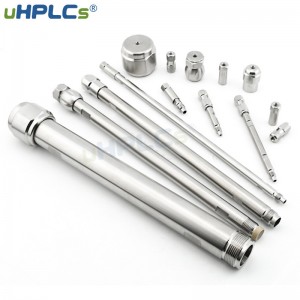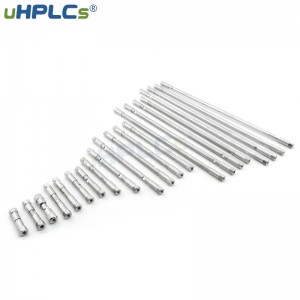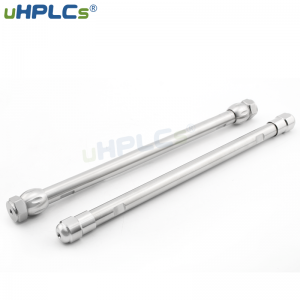Temperature changes can significantly impact the reproducibility of liquid chromatographic analysis methods and the column’s life. But why is this? uHPLCs will introduce you to the following content.
I. Reproducibility
As the temperature changes, the thermodynamics between the stationary and mobile phases within a liquid chromatography column is directly affected. Running the method at different temperatures may affect the analyte capacity factor (k) or the retention time of the analyte on the column.
At elevated temperatures, the kinetic energy of both the mobile phase and the analyte will increase. This increase in the kinetic energy of the analytes will cause them to move and vibrate more vigorously. It will disrupt intermolecular binding, the mechanism of separation and retention between the analytes and the stationary phase. This will often result in a faster flow of all analytes out of the column, thus shortening the retention time. Usually, this is most noticeable with large temperature jumps.
Temperature changes of only a few degrees Celsius affect only a few specific analytes in the chromatogram. A slight temperature difference is sufficient to promote favourable interactions of the analytes with the stationary or mobile phase. This specific interaction can be seen in the sample chromatogram because only one analyte has a change in retention time compared to the other analytes, which would otherwise maintain their retention time. Since it is difficult to predict which analytes will exhibit retention changes due to small temperature fluctuations, the best practice is to maintain a consistent temperature by opening the column heater and attaching the cap to the column heater.

Thermodynamics continues to affect chromatography by influencing the mobile phase’s viscosity as a temperature function. Many chromatographer have captured and used this relationship to HPLC column advantage. In general, as the viscosity of the mobile phase decreases, the counterpressure on the column decreases directly, allowing the method to flow at a higher flow rate without reaching the maximum pressure of the column or instrument.
One reason for the superiority of acetonitrile over methanol is the lower viscosity of acetonitrile (0.37 cPoise versus cPoise choices for methanol). When using methanol as an organic solvent in reversed-phase LC, the temperature of the method tends to be 40 – 60 °C to help reduce the back pressure by lowering the viscosity.
The unfolding of large bioanalytics may change, resulting in changes in their 3D structure. Denaturation or unfolding may occur due to many factors, one of which is temperature. The uHPLCs USHB C8 column is suitable for separating most hydrophobic compounds. If the biological sample is partially unfolded, it may expose hydrophobic or hydrophilic groups that may have been previously buried in the folded structure, which may affect the overall retention time of the analyte.
Second, the life of the liquid phase analysis column
Temperature also affects the overall life of the column. The chromatographic column’s stationary phase drives its maximum temperature specification. The temperature stability of a column may vary depending on the solvent and buffer used. 60°C to 90°C is a typical maximum temperature range for most reversed-phase columns.
Elevated temperatures under acidic conditions provide favourable thermodynamic conditions for the hydrolysis of ligands bonded to silica. Hydrolysis is observed as an early shift in retention time due to the loss of the stationary phase that provides retention interactions for the analytes. The loss of separation between peaks will occur more rapidly than the overall shift in retention time.
It is common to see a decrease in baseline separation or peaks merging compared to a new column with the same stationary phase. It is best practice not to leave the lc column in the case when it is open and no solvent is flowing through the system. Most mobile phases contain some organic material that will evaporate more quickly when the lc column is improperly stored.
Post time: Jul-29-2022








